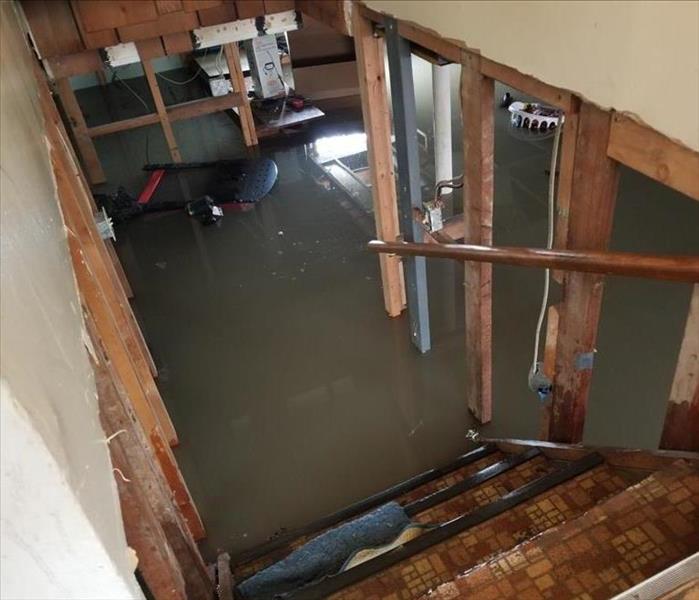How to Prevent Basement Floods
11/11/2021 (Permalink)
Unexpected water in your basement can damage walls and floors, destroy carpeting, ruin furniture, and lead to mold. These spaces are often used for storage; a wet basement can ruin irreplaceable items like photo albums, antiques, and family heirlooms. It is crucial to determine if it is safe to leave things in areas that may flood and take precautions to prevent the risk of flooding.
Whether it's a plumbing leak, roof leak, or a basement filled with water, water damage can require a costly fix. Taking the proper precautions can save you money, time, and headaches in the future, and it may even help protect against large, unforeseen natural disasters. Here are a few home improvements to make water damage less likely:
Add or update drainage. Use gutters and downspouts to make sure water is diverted away from your home and its foundation.
The most straightforward solutions to overflowing gutters are either adding another downspout on that gutter run or increasing the downspout size. The best solution between these two is probably adding another downspout; the second downspout can act as a backup if the first one gets blocked.
If you choose to replace the existing downspout with a larger one, make sure the contractor increases the size of the corresponding hole in the gutter.
- Install a sump pump. Try this addition if water damage has been a severe problem in your home's lower level. Choose a cast-iron sump pump, which may last longer, and consider buying a battery-powered backup pump if the power goes out.
- Seal Your Basement. This is a logical step, but many homeowners fail to keep up with it year after year. Sealing openings to your basement means keeping weatherstripping around doors in good condition and making sure windows are caulked.
- Install a water leak detection system.
An automatic water shut-off valve is a water leak detection system that will shut off the water supply to the home when it detects water on the floor or an irregular flow in the pipe.
- Check Your Landscaping
Although plants absorb water from the soil, they can also cause water intrusion in your basement. If they're too close to the foundation, roots may penetrate, resulting in cracks or bowing walls that allow water in. Overgrown shrubs may also restrict once-proper drainage and allow water to pool too close to your home.
- Clean the Gutters
Clean the gutters on your roof to ensure that they don't overflow during a rainstorm. The downspouts carry the water away from your home, and if they aren't clear of debris, the water might flow into your home's basement.
- Check Your Foundation for Cracks
Check your home's foundation from the inside and outside for any cracks. If you notice small cracks, use caulk to seal them. If the cracks are extensive, you will need the help of a professional to fix them before they cause damage to your basement.
Our SERVPRO team of Summit Lake, Park & Eagle Counties are Professionals in water damage restoration, and we are your best option to efficiently and thoroughly inspect your home of standing water and get it cleaned up quickly. Several potential problems could arise from waiting to address standing water in your house.
Give our SERVPRO of Summit Lake, Park & Eagle Counties a call today to help avoid these concerns as much as possible. We are 24/7 Emergency Response at 970-949-3235.






 24/7 Emergency Service
24/7 Emergency Service
